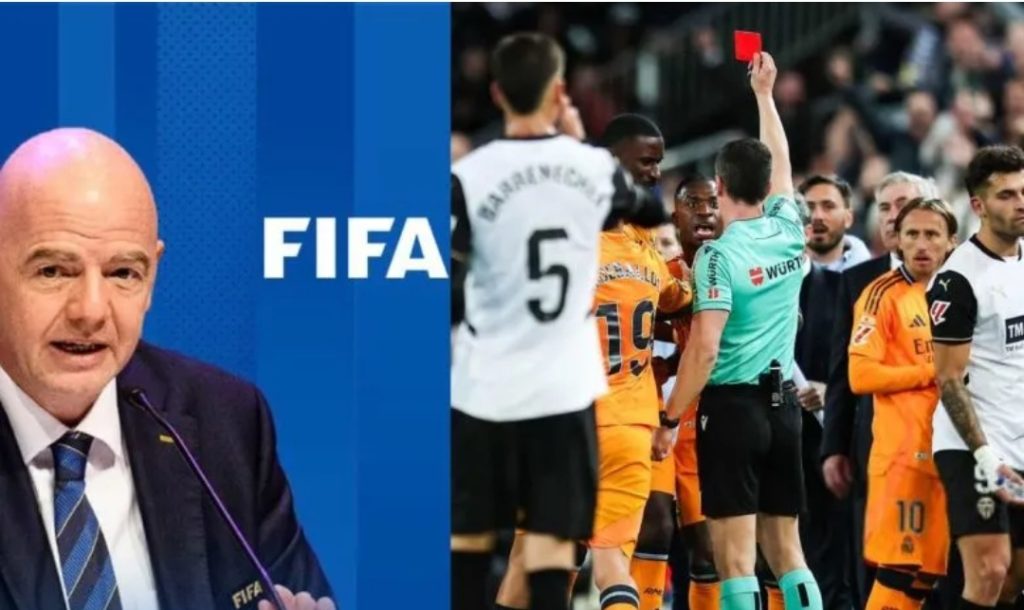The debate surrounding the use of VAR (Video Assistant Referee) in football has resurfaced, fueled by the controversial red card issued to Vinícius Jr. during Real Madrid’s clash with Valencia at Mestalla. This incident has not only infuriated the club but has also raised questions about the system’s integrity and purpose.
According to journalist José Félix Díaz of Marca, FIFA is reportedly investigating the situation, with a view to proving that VAR was misapplied in Vinícius’ case. This latest controversy highlights a broader issue, as FIFA believes VAR has deviated from its original intent, becoming excessively interventionist and less transparent. This misapplication, they argue, undermines its credibility and usefulness in the game.
Real Madrid has long expressed its dissatisfaction with officiating in Spanish football. The club views the Mestalla incident as a tipping point, prompting renewed calls for a complete overhaul of refereeing standards and practices. The club’s management, including President Florentino Pérez, has been vocal about the need for reform, recently addressing their concerns directly with FIFA President Gianni Infantino during a meeting in Doha.
The mistrust of refereeing extends beyond VAR itself. Real Madrid is critical of the Spanish Football Federation’s (RFEF) Technical Committee of Referees, which they accuse of incompetence and lacking credibility. Despite the recent change in leadership within the RFEF, the club believes the deeper systemic issues remain unresolved.
FIFA’s apparent alignment with Real Madrid’s concerns is a rare moment of agreement between football’s global governing body and one of its most influential clubs. For Real Madrid, this signals potential momentum for change. However, the club’s isolation in this stance is notable, as no other major Spanish club has openly supported such calls for reform.
The controversy surrounding Vinícius’ red card underscores broader questions about the role and future of VAR. Initially introduced to minimize human error, the system has instead sparked debates about subjectivity and inconsistency in decision-making. FIFA’s desire to revisit and potentially reform the system reflects growing dissatisfaction among players, coaches, and fans alike.
Real Madrid’s frustration with Spanish officiating has historical roots. The club has frequently found itself at odds with referees, often feeling targeted or unfairly treated. The incident at Mestalla, in their eyes, is not an isolated event but part of a larger pattern of perceived injustice.
FIFA’s proposed reforms could include measures to reduce VAR’s interventionist nature, focusing on clear and obvious errors rather than micromanaging the game. Transparency could also be improved by allowing fans and broadcasters access to the decision-making process, much like rugby’s use of the TMO (Television Match Official).
Despite the controversy, VAR remains a divisive tool in football. Some argue that its benefits, such as correcting offside calls and missed fouls, outweigh its drawbacks. However, critics contend that its implementation often disrupts the flow of the game and shifts the focus away from the players to the officials.
Real Madrid’s involvement in this debate adds significant weight to the issue. As one of the most successful and influential clubs in football history, their stance could pressure FIFA and other governing bodies to act decisively. Yet, the lack of support from other clubs suggests that widespread consensus may be difficult to achieve.
The Mestalla incident also reignites discussions about the role of referees in the modern game. While technology can assist decision-making, the human element remains vital. Striking a balance between the two will be crucial in determining the future of officiating.
Real Madrid’s ongoing battle for refereeing reform reflects a broader struggle within football to adapt to technological advancements while preserving the game’s integrity. FIFA’s willingness to reconsider VAR’s use is a step in the right direction, but meaningful change will require collaboration among all stakeholders.
As discussions unfold, Vinícius Jr.’s red card serves as a reminder of VAR’s imperfections. Whether this incident becomes a catalyst for reform or just another chapter in VAR’s contentious history remains to be seen.
For now, Real Madrid’s demands for accountability and change highlight the need for a transparent and fair officiating system. The club’s persistence in pushing this agenda could pave the way for a more equitable future in football.
FIFA’s investigation into the Mestalla incident will likely set a precedent for how similar cases are handled moving forward. The footballing world will be watching closely, not just for the outcome, but for the broader implications for the game’s governance.
As the debate continues, one thing is clear: the future of VAR and refereeing in football is at a crossroads. How FIFA and other governing bodies respond will shape the game for years to come.

